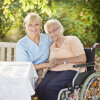Chronic Obstructive Pulmonary Disease, or COPD, describes a spectrum of irreversible, progressive conditions permanently affecting airflow to the lungs. These conditions include chronic bronchitis and emphysema. Patients with chronic bronchitis struggle to bring air into their lungs due to inflamed, swollen airways clogged with excess mucus. Seniors with emphysema have damage to the small air sacs in their lungs, which makes it difficult for them to absorb oxygen and expel carbon dioxide. Usually the diagnosis of COPD entails some combination of both of these conditions.
Frequently undiagnosed, COPD is one of the top five causes of death in the United States. As many as 12 million people have COPD but do not know it. Symptoms develop slowly and are often missed or discounted. It is not unusual for seniors with COPD to have lost over 50 percent of their lung capacity before their diagnosis, so it is especially important for those working in senior care to become familiar with the symptoms.
One of the earliest signs of COPD is difficulty doing every day activities. Those involved with senior care should monitor seniors for apparent trouble completing the same activities as their peers, unusual fatigue or weight loss. Additional symptoms of COPD include: shortness of breath, wheezing, chronic coughing with mucus and a tight chest. Seniors with advanced COPD may have blue lips and nail beds, morning headaches or cough blood. Side effects of COPD include a higher incidence of heart problems, depression and an increased susceptibility to respiratory infections.
Over 80 percent of those with COPD are smokers or have a history of smoking. COPD strikes women more often than men. Other significant risk factors include: secondhand smoke, dust or chemical exposure and air pollution. Less than 1 percent of patients with COPD got it through the inherited genetic disorder Alpha-1 antitrypsin deficiency.
While COPD cannot be cured, it can be managed. Treatment for this disease focuses on avoiding further deterioration of the lungs and reducing symptoms. COPD patients should quit smoking and avoid secondhand smoke. Medication and supplemental oxygen can relieve symptoms by reducing inflammation and easing breathing. Pulmonary rehabilitation can help seniors learn proper breathing techniques and exercises to recondition their lungs and improve lung capacity. Additionally, every senior should get an annual flu shot to help prevent respiratory infection. With proper senior care, COPD does not have to reduce the quality of a senior’s life.










